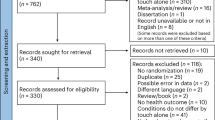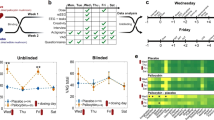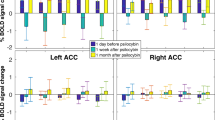Abstract
OBJECTIVE: The primary purpose was to examine 2-y effects of weight change on personality traits in severely obese subjects treated conventionally or surgically. We also assessed differences between the severely obese patients and a primarily normal-weight reference group.
METHOD: Personality traits were assessed using 7 of 15 scales from the Karolinska Scales of Personality (KSP): Somatic Anxiety, Muscular Tension, Psychasthenia, Psychic Anxiety, Monotony Avoidance, Impulsiveness, and Irritability. A total of 1380 surgical candidates, 1241 conventionally treated patients and 1135 subjects from the SOS (Swedish Obese Subjects) reference study, representing the general population, completed the KSP. Data presented in this study were gathered twice from the patients (prior to treatment and after 2 y) and once from the reference subjects. Significance tests and effect sizes (ES) were calculated.
RESULTS: At baseline, the obese were characterised as more anxiety prone, impulsive, irritable and less monotony avoiding than the reference group; surgery patients more so than the conventionally treated. At follow-up, it was found that anxiety proneness decreased and Monotony Avoidance increased with increasing weight loss. The conventionally treated were, on average, weight stable and, hence, only a small decrease was noted regarding Somatic Anxiety. The surgery group lost on average 28 kg, and differences between surgically treated and the reference group decreased on all scales except Impulsiveness, which remained unchanged. The largest improvement was in relation to Psychasthenia.
CONCLUSIONS: Weight reduction maintained for 2 y was associated with changes on practically all personality traits in proportion to the magnitude of weight loss. In particular, Psychasthenia seemed to be alleviated, while Impulsiveness was unaffected.
This is a preview of subscription content, access via your institution
Access options
Subscribe to this journal
Receive 12 print issues and online access
$259.00 per year
only $21.58 per issue
Buy this article
- Purchase on Springer Link
- Instant access to full article PDF
Prices may be subject to local taxes which are calculated during checkout




Similar content being viewed by others
References
O'Neil PM, Jarrell MP . Psychological aspects of obesity and very low-calorie diets. Am J Clin Nutr 1992; 56: 185S–189S.
Crisp A, McGuinnes B . Jolly fat: relation between obesity and psychoneurosis in general population. Br Med J 1976; 1: 7–9.
Leon GR, Roth L . Obesity: psychological causes, correlations, and speculations. Psych Bull 1977; 84: 117–139.
Fassino S, Leombruni P, Pierò A, Daga GA, Amianto F, Rovera G, Rovera GG . Temperament and character in obese women with and without binge eating disorder. Compr Psychiatry 2002; 43: 431–437.
Mills JK . The obese personality: defense, compromise, symbiotic arrest, and the characterologically depressed self. Issues Psychoanalyt Psychol 1994; 16: 67–80.
Wickramasekera I, Price DC . Morbid obesity, absorption, neuroticism, and the high risk model of threat perception. Am J Clin Hypnosis 1996; 39: 291–301.
Björvell H, Edman G, Rössner S, Schalling D . Personality traits in a group of severely obese patients: a study of patients in two self-chosen weight reducing programs. Int J Obes 1985; 9: 257–266.
Rydén O, Danielsson A . Personality features of grossly obese surgical patients—a preoperative study. Archiv Psychol 1983; 135: 115–134.
Duckro PN, Leavitt JN, Beal DG, Chang AF . Psychological status among female candidates for surgical treatment of obesity. Int J Obes 1983; 7: 477–485.
Blankmeyer B, Smylie K, Price D, Costello R, McFee A, Fuller D . A replicated five cluster MMPI typologi of morbidly obese female candidates for gastric bypass. Int J Obes Relat Metab Disord 1990; 14: 235–247.
Webb WW, Morey LC, Castelnuovo-Tedesco P, Scott HW . Heterogeneity of personality in massive obesity and outcome prediction of bariatric surgery. Int J Obes Relat Metab Disord 1990; 14: 13–20.
Poston WSC, Ericsson M, Linder J, Nilsson T, Goodrick GK, Foreyt JP . Personality and the prediction of weight loss and relapse in the treatment of obesity. Int J Eat Disord 1999; 25: 301–309.
Grana AS, Coolidge FL, Merwin MM . Personality profiles of the morbidly obese. J Clin Psychol 1989; 45: 762–765.
Bull R, Legorreta G . Outcome of gastric surgery for morbid obesity: weight changes and personality traits. Psychother Psychosom 1991; 56: 146–156.
Bull R, Engels W, Engelsmann F, Bloom L . Behavioural changes following gastric surgery for morbid obesity: a prospective, controlled study. J Psychosom Res 1983; 27: 447–457.
Maddi SR, Fox SR, Khoshaba DM, Harvey RH, Lu JL, Persico M . Reduction in psychopathology following bariatric surgery for morbid obesity. Obes Surg 2001; 11: 680–685.
Larsen F, Torgersen S . Personality changes after gastric banding surgery for morbid obesity. A prospective study. J Psychosom Res 1989; 33: 323–334.
Pervin L . Personality. Theory and research, 5th edn. John Wiley & Sons, Inc: New York; 1989.
Sjöström L, Larsson B, Backman L, Bengtsson C, Bouchard C, Dahlgren S, Hallgren P, Jonsson E, Karlsson J, Lapidus L, Lindroos A-K, Lindstedt S, Lissner L, Narbro K, Näslund I, Olbe L, Sullivan M, Sylvan A, Wedel H, gren G . Swedish obese subjects (SOS). Recruitment for an intervention study and a selected description of the obese state. Int J Obes Relat Metab Disord 1992; 16: 465–479.
Sullivan M, Karlsson J, Sjöström L, Backman L, Bengtsson C, Bouchard C, Dahlgren S, Jonsson E, Larsson B, Lindstedt S, Näslund I, Olbe L, Wedel H . Swedish obese subjects (SOS)—an intervention study of obesity. Baseline evaluation of health and psychosocial functioning in the first 1743 subjects examined. Int J Obes Relat Metab Disord 1993; 17: 503–512.
Sjöström L . Surgical intervention as a strategy for treatment of obesity. Endocrine 2000; 13: 213–230.
Lindroos A-K . Baseline description of the SOS study group and nutritional changes over 10 years. In: Medeiros-Neto G, Halpern A, Bouchard C (eds). Progr Obes Res, vol. 9. Eastleigh, UK: John Libbey & Company Ltd; 2002. pp. 969–972.
Schalling D, Edman G, Åsberg M . Impulsive cognitive style and inability to tolerate boredom. In: Zuckerman M (ed). Biological bases of sensation seeking, impulsivity and anxiety. Erlbaum: Hillsdale, NJ; 1983. pp. 123–145.
Klinteberg Ba, Schalling D, Magnusson D . Childhood behaviour and adult personality in male and female subjects. Eur J Pers 1990; 4: 57–71.
Gustavsson JP, Weinryb RM, Göransson S, Pedersen NL, Asberg M . Stability and predictive ability of personality traits across 9 years. Pers Individ Diff 1997; 22: 783–791.
Gustavsson JP . Stability and validity of self-reported personality traits, Thesis from the Department of Clinical Neuroscience, Psychiatry Section, and the Institute for Environmental Medicine, Division of Genetic Epidemiology, Karolinska Institute 1997. Stockholm University: Stockholm.
Rydén A, Sullivan M, Torgerson JS, Karlsson J, A-K L, Taft C . Severe obesity and personality: a comparative controlled study of personality traits. Int J Obes Relat Metab Disord 2003; 27: 1534–1540.
Cohen J . Statistical power analysis for the behavioral sciences, 2nd edn. Lawrence Erlbaum: Hillsdale, NJ; 1988.
Matthews G, Saklofske DH, Costa Jr PT, Deary IJ, Zeidner M . Dimensional models of personality: a framework for systematic clinical assessment. Eur J Psychol Assess 1998; 14: 36–49.
Fitzgibbon ML, Stolley MR, Kirschenbaum DS . Obese people who seek treatment have different characteristics than those who do not seek treatment. Health Psychol 1993; 12: 342–345.
Karlsson J, Sjöström L, Sullivan M . Swedish obese subjects (SOS)—an intervention study of obesity. Two-year follow-up of health-related quality of life (HRQL) and eating behavior after weight reduction surgery in severe obesity. Int J Obes Relat Metab Disord 1998; 22: 113–126.
Rydén A, Karlsson J, Persson L-O, Sjöström L, Taft C, Sullivan M . Obesity-related coping and distress and relations to treatment preference. Br J Clin Psychol 2001; 40: 177–188.
Higgs ML, Wade T, Cescato M, Atchison M, Slavotinek A, Higgins B . Differences between treatment seekers in an obese population: medical intervention vs dietary restriction. J Behav Med 1997; 20: 391–405.
Yanovski SZ . Binge eating disorders: current knowledge and future directions. Obes Res 1993; 1: 306–324.
Adami GF, Gandolfo P, Bauer B, Scopinaro N . Binge eating in massively obese patients undergoing bariatric surgery. Int J Obes Relat Metab Disord 1995; 18: 135–143.
Fontaine KR, Bartlett SJ, Barofsky I . Health-related quality of life among obese persons seeking treatment and not currently seeking treatment. Int J Eat Disord 2000; 27: 101–105.
Doll HA, Petersen SEK, Stewart-Brown SL . Obesity and physical and emotional well-being: associations between body mass index, chronic illness, and the physical and mental components of the SF-36 questionnaire. Obes Res 2000; 8: 160–170.
Peltonen M, Lindroos A, Torgerson J . Musculoskeletal pain in the obese: a comparison with a general population and long-term changes after conventional and surgical obesity treatment. Pain 2003; 104: 549–557.
Dhabuwala A, Cannan R, Stubbs R . Improvement in co-morbidities following weight loss from gastric bypass surgery. Obes Surg 2001; 11: 428–435.
Dixon J, Chapman L, O'Brien P . Marked improvement in asthma after Lap-Band surgery for morbid obesity. Obes Surg 1999; 9: 385–389.
Karason K, Lindroos A, Stenlöf K, Sjöström L . Relief of cardiorespiratory symptoms and increased physical activity after surgically induced weight loss: results from the Swedish Obese Subjects study. Arch Intern Med 2000; 160: 1797–1802.
Berkowitz L . Frustration-aggression hypothesis: examination and reformulation. Psych Bull 1989; 106: 59–73.
Tice DM, Bratslavsky E, Baumeister RF . Emotional distress regulation takes precedence over impulse control: If you fell bad, do it!. J Pers Soc Psychol 2001; 80: 53–67.
Nagata T, Matsuyama M, Nobuo K, Iketani T, Oshima J . Stress coping strategy in Japanese patients with eating disorders: relationship with bulimic and impulsive behaviors. J Nervous Mental Dis 2000; 188: 280–286.
Rydén A, Karlsson J, Sullivan M, Torgerson J, Taft C . Coping and distress: what happens after intervention? A 2-year follow-up from the Swedish Obese Subjects (SOS) study. Psychosom Med 2003; 65: 435–442.
Acknowledgements
This study was financed by grants from The Swedish Council for Working Life and Social Research (Project 2001-1106), the Swedish Foundation for Health Care Sciences and Allergy Research (Project V96 065), the Swedish Research Council (Project Y0748), the Faculty of Medicine, Göteborg University.
Author information
Authors and Affiliations
Corresponding author
Rights and permissions
About this article
Cite this article
Rydén, A., Sullivan, M., Torgerson, J. et al. A comparative controlled study of personality in severe obesity: a 2-y follow-up after intervention. Int J Obes 28, 1485–1493 (2004). https://doi.org/10.1038/sj.ijo.0802768
Received:
Revised:
Accepted:
Published:
Issue Date:
DOI: https://doi.org/10.1038/sj.ijo.0802768
Keywords
This article is cited by
-
Prevalence of Unhealthy Lifestyle Patterns Among Overweight and Obese Adults
Obesity (2010)
-
Increased relative risk of subsequent affective disorders in patients with a hospital diagnosis of obesity
International Journal of Obesity (2006)



